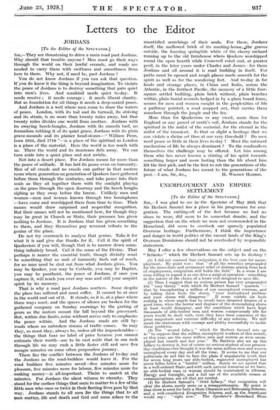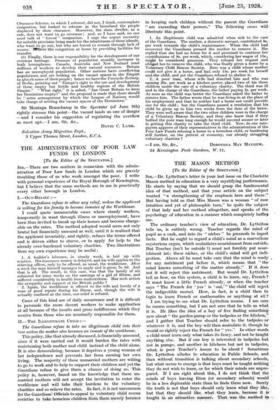UNEMPLOYMENT AND EMPIRE SETTLEMENT
[To the Editor of the SPECTATOR.] SIRS I" was glad to see in-the Spectator of May 26th that Sir Herbert Samuel has a place in his programme for emi- gration. The cutting-off of the feet because we had no shoes to wear, did seem to be somewhat drastic, and the suggestion that on the whole we were not overcrowded in the Homeland, did seem to overlook our sparsely populated Overseas heritage. Furthermore, I think the importance and danger in world politics of the vacant lands of the King's Overseas Dominions should not be overlooked by responsible statesmen.
May I offer a few observations on the subject and on the " fallacies " which Sir Herbert Samuel sets up to destroy ?
(1) I did not contend that emigration is the best cure for unem- ployment. My point was : that ' of all the remedies propounded for the immediate and permanent relief of distress arising from lack of employment, emigration still holds the field." In a sense I am even willing to regard it as one does a surgical operation—something in the nature of the choice of a lesser evil designed to save life.
(2) Then I suggest that no serious person has ever propounded the easy theory " with which Sir Herbert Samuel " quarrels "— `that by transplanting a million of our unemployed overseas, and by taking theni from the slums, " your unemployed problem and your slums will disappear." If some zealots (or fools .rushing in where angels fear to tread) have dreamed dreams of a good tune, when the horror and disgrace of the demoralizing slums at least would disappear, and the conditions which have kept thousands of able-bodied men and women conspicuously idle for years would be dealt with, even they have been conscious of the great magnitude and extreme difficulty of any solution. We still await the statesman with courage and ability successfully to tackle these problems.
(3) The " second fallacy " which Sir Herbert Samuel sets up is " to suppose that the million unemployed workers of this month, or this year, are the same million men and women as were unem- ployed last month and last year." Mr. Baldwin also set up this fallacy to destroy it, but of course no serious student of our present- day conditions ever thought it was the same million men and women unemployed every day and all the time. It seems to me that our politicians do not like to face the plain if unpalatable truth that for seven long years our able-bodied, registered unemployed has ,
never fallen below a fateful " million. Surely we arc agreed that in a well-ordered State, and with such natv.ral resources as we have, no able-bodied .man or woman should be maintained in idleness. Energy and foresight, and a full use of the available means of communications, are all that are needed. (4) Sir Herbert Samuel's " third fallacy," that emigration will clear the slums, surely rests on a misapprehension. My point is that there is need for both a Slum Clearance and Rehousing Scheme, and a well-considered Emigration Scheme, and, as the Americans would 'say ir. " right no " The Spectistor'e– ' Homeland Slum
•
Clearance Scheme, to which I referred, did not, I think, contemplate emigration, but looked to rehouse in the 'hiimelarid the people displaced by slum clearance. Moreover, the slum dweller, as a rule, does not want to go overseas ; and, as I have said, no one need talk of " forced " emigration. I urge the urgent necessity for suitable provision being made for the inhabitants of these islands, who want to go out, but who are forced to remain through lack of means. PORlleve the congestion at home by providing facilities for
transfer. - •
(5) Finally, there is our responsibility for the development of our overseas heritage. Pressure of population steadily increases in both hemispheres. Canada, Australia and New Zealand need millions of workers to develop their natural resources. Britain has an unemployed population. Other nations have overflowing populations, and are looking on the vacant spaces in the Empire to absorb some of their people; hence we have the Vossische Zeitung, of Berlin, pointing out " Europe's right to the use and development of these empty but fertile and healthy regions of the British Empire." "What right," it is asked, " hai Great Britain to keep her Dominions empty?" and the proposal is made that there should- be " some arrangement by which the League of Nations would take charge of settling the vacant spaces of the Dominions."
Sir Montagu Beauchamp in the Spectator (of June 9th) rightly stresses this point—the vacant lands as one of danger —and I consider his suggestion of regulating the overflow as most apt.—I am, Sir, &c., DAVID C. LAmp.
Salvation Army Migration Dept., 3 Upper Thames Street, London, E.C.4.































 Previous page
Previous page